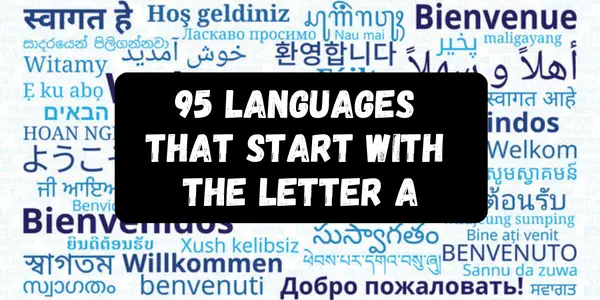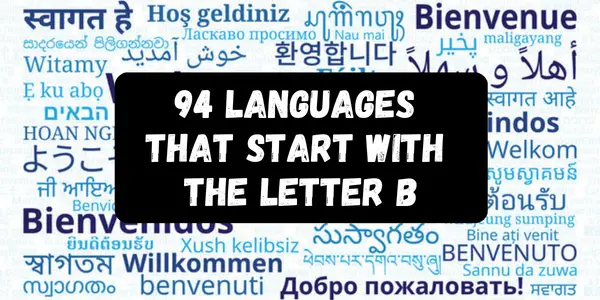Have you ever wondered about the vast array of languages that start with the letter G? Wonder no more, you have come to the right place.
In this article, I will embark on a linguistic journey, delving into the rich tapestry of languages that begin with the letter G. From the ancient to the modern, from the exotic to the widely spoken, these captivating languages hold a treasure trove of culture and history
So, without further ado, let’s dive into the fascinating realm of languages that start with G and witness the beauty they bring to our world.
Languages That Start With The Letter G
The followings are some of the most known and lesser-known languages that begin with the letter G (In alphabetical order):
1. Ga: Ga is a Kwa language spoken in Ghana, particularly in the Greater Accra Region. It serves as a marker of Ga cultural identity and is used in various aspects of their daily life.
2. Gaelic: Gaelic refers to the Celtic language family, which includes Scottish Gaelic and Irish Gaelic. These languages are spoken in Scotland and Ireland, respectively, and hold deep cultural significance for the Gaelic-speaking communities.
3. Galician: Galician is a Romance language spoken in Galicia, a region in northwest Spain. It has its roots in medieval Galician-Portuguese and shares similarities with Portuguese. Galician serves as an essential medium for Galician cultural expression.
4. Gan: Gan is a variety of Chinese spoken in Jiangxi province and surrounding areas. It is used by the Gan-speaking communities and has its own linguistic features.
5. Ganda: Ganda, also known as Luganda, is a Bantu language spoken in Uganda. As one of the major languages in the country, Ganda plays a crucial role in Ugandan cultural identity.
6. Garo: Garo is a Tibeto-Burman language spoken in parts of northeastern India and Bangladesh. It serves as a significant marker of Garo cultural heritage.
7. Gaulish: Gaulish is an extinct Celtic language that was once spoken in ancient Gaul, a region that included present-day France, Belgium, and parts of Switzerland and Italy. Its study provides valuable insights into the linguistic history of ancient Gaul.
8. Gbaya-Manjia: Gbaya-Manjia is a Niger-Congo language spoken in the Central African Republic. It serves as an important means of communication for the Gbaya-Manjia people.
9. Ge’ez: Ge’ez, also known as Ethiopic, is an ancient Semitic language that was historically used in Ethiopia and Eritrea. It serves as the liturgical language for the Ethiopian Orthodox Church and has a rich literary tradition.
10. Georgian: Georgian is a Kartvelian language spoken in Georgia, a country in the Caucasus region. As the official language of Georgia, Georgian holds cultural significance for the Georgian people.
11. German: German is a West Germanic language spoken primarily in Germany, Austria, Switzerland, and parts of Italy and Belgium. As one of the most widely spoken languages in Europe, German has a profound impact on literature, philosophy, and science.
12. Gikuyu: Gikuyu, also known as Kikuyu, is a Bantu language spoken in Kenya. It serves as an essential marker of Gikuyu cultural identity and is used by millions of people.
13. Gilaki: Gilaki is an Iranian language spoken in Iran, particularly in the Gilan province. It has its own distinct linguistic features and cultural influences.
14. Gilbertese: Gilbertese, also known as Kiribati, is an Austronesian language spoken in Kiribati. It serves as an important marker of Kiribati cultural identity and is used in various domains.
15. Gilyak: Gilyak, also known as Nivkh, is a language spoken in the Russian Far East, particularly in the Sakhalin and Kuril Islands. It is used by the Gilyak people and reflects their unique cultural heritage.
16. Gisu: Gisu is a Bantu language spoken in Uganda. It serves as an important means of communication for the Gisu people.
17. Glagolitic: Glagolitic is an ancient script used for writing various Slavic languages, particularly Old Church Slavonic. It has historical importance and reflects the cultural heritage of Slavic-speaking communities.
18. Gola: Gola is a Mande language spoken in Sierra Leone and Liberia. It serves as an essential marker of Gola cultural identity and is used by the Gola people in various settings.
19. Gondi: Gondi is a Dravidian language spoken in central India, primarily in the states of Maharashtra, Madhya Pradesh, Chhattisgarh, and Telangana. With millions of speakers, Gondi plays a significant role in the cultural identity of Gondi-speaking communities.
20. Gothic: Gothic is an extinct East Germanic language that was historically spoken by the Goths. It is one of the earliest attested Germanic languages and provides valuable insights into the linguistic history of the Germanic peoples.
21. Grebo: Grebo is a Kru language spoken in Liberia and Ivory Coast. It serves as an essential marker of Grebo cultural identity and is used by the Grebo people in various aspects of their lives.
22. Greek: Greek is an Indo-European language spoken primarily in Greece and Cyprus. As one of the world’s oldest languages, Greek has a rich literary and historical tradition and holds cultural significance for the Greek-speaking communities.
23. Greenlandic: Greenlandic, also known as Kalaallisut, is an Eskimo-Aleut language spoken in Greenland. As the official language of Greenland, Greenlandic is an essential part of the cultural identity of the Greenlandic people.
24. Guarani: Guarani is a Tupi-Guarani language spoken in Paraguay and parts of Argentina, Brazil, and Bolivia. It is one of the official languages of Paraguay and holds cultural importance for the Guarani-speaking communities.
25. Guaymi: Guaymi, also known as Ngäbere, is a Chibchan language spoken in Panama and Costa Rica. It serves as a significant marker of Guaymi cultural heritage.
26. Gujarati: Gujarati is an Indo-Aryan language spoken in the Indian state of Gujarat and by the Gujarati diaspora worldwide. With millions of speakers, Gujarati plays a vital role in the cultural expression of the Gujarati people.
27. Gullah: Gullah is a Creole language spoken by the Gullah/Geechee people in the coastal regions of South Carolina, Georgia, and Florida. It emerged from the interactions between African slaves and European settlers and holds cultural significance for the Gullah community.
28. Gurage: Gurage is an Afro-Asiatic language spoken in Ethiopia. It serves as a marker of Gurage cultural identity and is used by the Gurage people in various domains.
29. Gurkhali: “Gurkhali” is sometimes used to refer to the Nepali language, which is the official language of Nepal and has cultural importance for the Gurkha community.
30. Gurma: Gurma is a Gur language spoken in Burkina Faso, Benin, and Togo. It serves as an important means of communication for the Gurma people.
31. Gurmukhi: Gurmukhi is a script used for writing Punjabi, a language spoken in Punjab, India, and Pakistan. It holds cultural importance for the Punjabi-speaking communities and is used in various literary and religious texts.
32. Gwich’in: Gwich’in is an Athabascan language spoken in northern Canada and Alaska, USA. It is used by the Gwich’in people and plays a significant role in their cultural heritage.
33. Gypsy: “Gypsy” is a term used to refer to the Romani language, spoken by the Romani people, who are dispersed across various countries. Romani has several dialects and serves as a marker of Romani cultural identity.
I hope you found this article “Languages That Start With G” helpful and got insights into some of the rare and lesser-known languages around the world.
Also, keep in mind that, this isn’t an exhaustive list, if there are any Languages starting with the letter G.
Feel free to leave a comment below with the missing Languages and I’ll update the list as soon as possible.
And, if you’d like to explore more Languages starting with different letters of the alphabet, click the link below:
- Languages That Start With H
- Languages That Start With I
- Languages That Start With J
- Languages That Start With K


